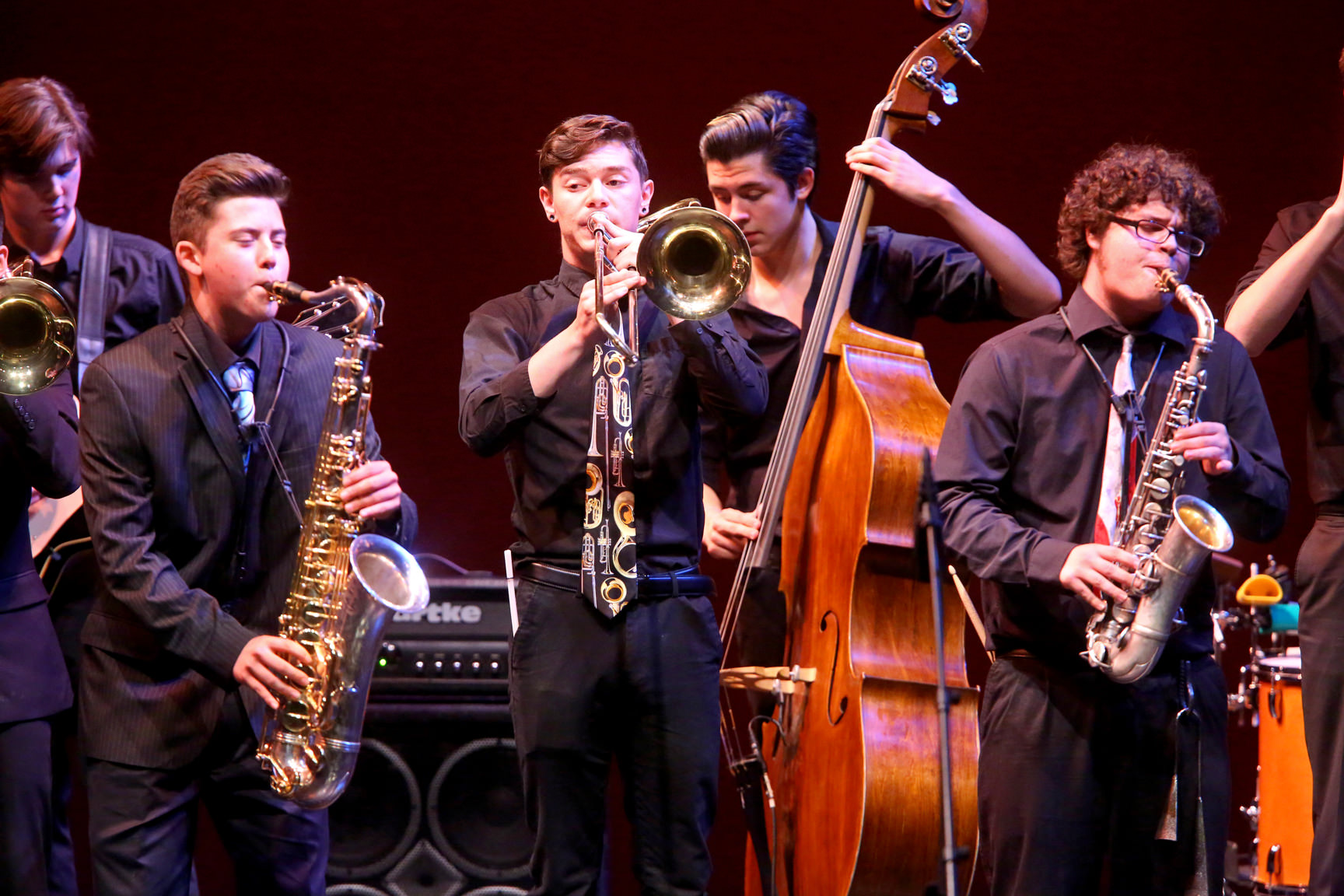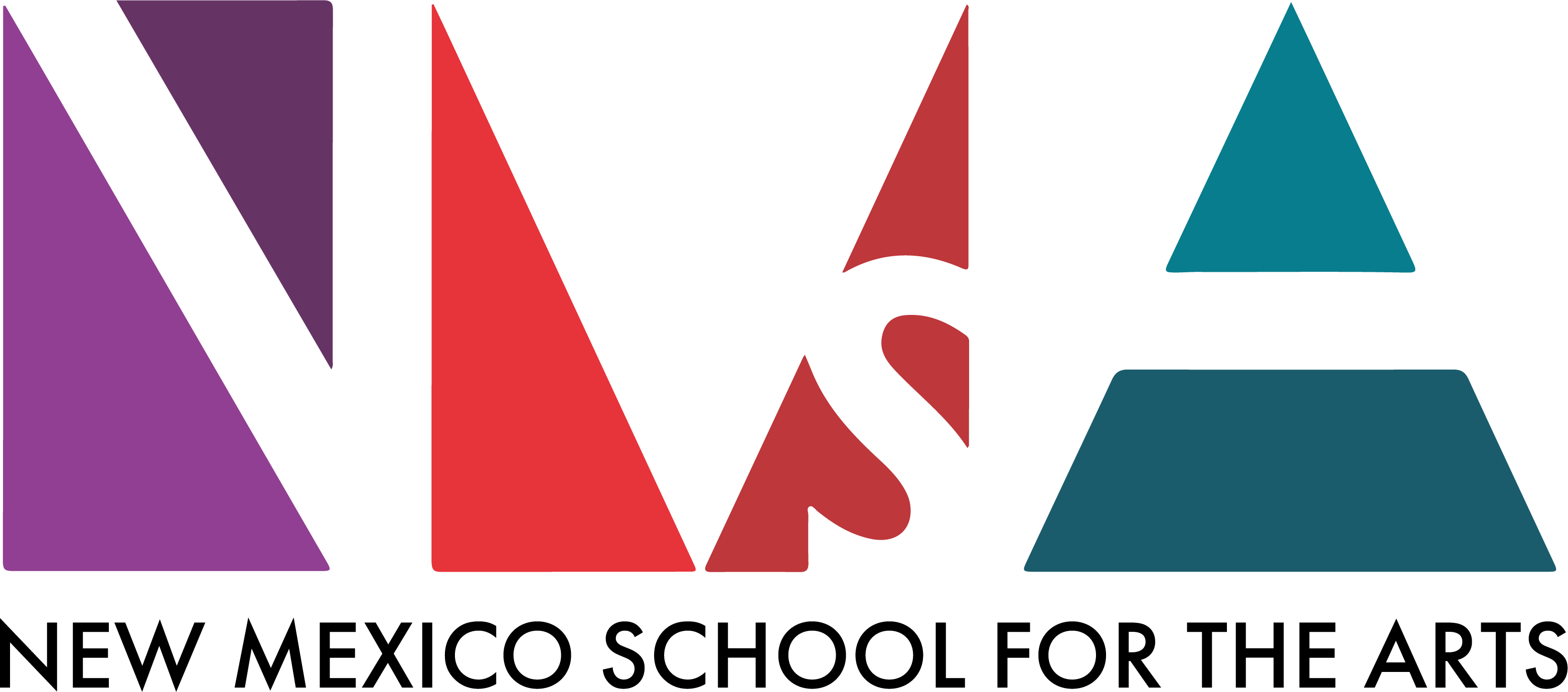Music

Guest Artist Program
We believe a student’s passion for the arts can propel them to success in every aspect of life. We are committed to fostering that success by providing a strong foundation for artistic and academic growth in an inclusive and challenging environment that encourages exploration, expands imagination and cultivates creativity.

John Rangel
Music Department Chair
john.rangel@nmsa-ai.org
If you have questions regarding curriculum or anything about the Music program, please contact John Rangel or use our Contact form and someone from the team will respond shortly.
Music Fundamentals 1 + 2
All students must complete this two year course starting freshman year to read music notation and understand common scales and harmonies. All Students learn how to express harmony with hands on keyboard training and study. Students learn how to decipher contemporary chord symbols and utilize harmonic building blocks for song writing and analysis. These courses follow the first two years of the Theory curriculum prescribed by the Berklee School of Music with additional projects to reinforce learning.
Music Tech - 11th Grade
Music Tech explores important music technology tools. In addition to songwriting students compose music for film and learn about sound design.The software used in our music computer lab includes Logic Pro (Digital Audio Workstation), Finale (professional music scoring app), and Ableton Live (Digital Audio Workstation). Students learn music tech terminology to converse with professional producers and talent. Students learn about mixers, channel strips, music EFX, plugins, samplers, EQ’s, compressors, limiters, microphones, audio interfaces, home studio setups, and much more. Students also have hands-on experience with outboard gear including analog synths, mixer routings, Mac Computers, and guitar EFX pedals. This course is designed to give a pre professional music technology foundation and set of skills that prepares students for the complex music industry.
NMSA Weekly Private Applied Lessons
Private study is the manner in which students develop their unique musical voice and pursue their specific musical goals with the guidance and support of a highly skilled private teacher and mentor. All NMSA music majors receive a 30-45 minute weekly private lesson with a professional, experienced performer and master educator/teaching artist in their specific area of study (instrument or voice). These weekly one on one lessons focus on advancing a student’s musical techniques primarily through the practice and performance of solo pieces, as well as technical studies such as scales and etudes. Private instruction helps students to assess and improve their own practice strategies and musical progress through self reflection and journaling. Private lessons also support the development of good ensemble skills to be applied in large ensembles.
Instrumental Lab Classes
Instrumental Lab Classes are group classes that provide students with daily opportunities for cooperative learning guided by a master teacher/teaching artist in their specific area of study (strings, percussion, piano, guitar, brass or woodwinds). In Instrumental Labs Classes, students hone their performance skills and learn from each other and their teacher through a variety of approaches including: technical studies as an ensemble, studio classes (or performance classes) where students perform solos for each other and learn to listen and perform with “critical and kind” ears; daily group practice of ensemble repertoire and/or technical studies; audition preparation masterclasses, and daily/weekly S.M.A.R.T practice goal setting including reflective writing in which they assess their own musical progress and develop effective practice strategies. Weekly Private Lessons are considered part of the Lab Class curriculum.
Piano Lab
The Piano Lab is a required course for all piano students, all 4 years. The focus of this course is on performance practice of solo pieces, practice techniques, self-critiquing and reflection on individual progress and goals, as well as audition and competition preparation. The curriculum includes scales, arpeggios, and other basics of classical and contemporary periods of solo piano repertoire.. The main time is allotted for individual practice, supervised by an experienced teacher, with supplemental material as possible for the whole group. Ensemble playing and accompanying is implemented as students’ abilities permit. Master classes by visiting artists and performances enrich the learning environment.
Piano LabBrass/Woodwind Lab and Ensemble
This course focuses on performance practice as well as rehearsal techniques for Brass and Woodwind instruments. The curriculum covers technical exercises and scales, solo and jazz and classical repertoire, rehearsal/performance.
Strings Lab
The NMSA Strings Lab is a required course for all string students, all 4 years. The focus of this course is on performance practice, as well as rehearsal and practice techniques for violin, viola, cello, and bass. The curriculum covers technical exercises and scales, solo and chamber music repertoire, string orchestra rehearsal/performance, and a weekly studio class (masterclass). We take advantage of the rich musical community in Santa Fe to attend open rehearsals and/or professional concerts, and periodically have internationally renowned guest artists, master teachers and current string faculty and alumni visit the class to work with students. Students have various outreach performance opportunities throughout the year, in addition to the concerts scheduled on the NMSA Music Calendar. The method book required for this class is Advanced Techniques for Strings
String Ensemble (String Orchestra)
The NMSA String Orchestra is recognized as one of the top student chamber orchestras in the state. The orchestra rehearses daily as part of Strings Lab Class and/or in daily ensemble rehearsals, and performs advanced level repertoire in a variety of genres including classical, contemporary, and latin. The orchestra frequently collaborates with NMSA chorus, band, and dance departments in numerous public performances each year. The string orchestra consistently scores the top level (Superior) rating at the annual regional Music Performance Assessments, and our orchestra students place in top chairs at the NMMEA All State Orchestra Festival every year. In addition to playing in the orchestra, string students have opportunities to participate and perform in chamber ensembles (string quartet, trio, or duos) and even a Mariachi ensemble. These ensembles perform for regional festivals and are often invited to perform for local, regional, and state governmental and professional events held at such auspicious venues as the Governor’s Mansion, the Lensic Performing Arts Center, Palace of the Governors, and more.
Percussion Lab and Ensemble
The NMSA Percussion program is consistently one of the top programs in the state, placing many students in All-State and earning the highest ratings at Solo and Ensemble Festivals. This course is for first- through fourth-year percussion students at NMSA and is meant to reinforce concepts taught in Music Fundamentals I & II, Music Tech/Creation, and Music History, as well as contributing to ensembles from a practical standpoint on a student’s instrument. Concepts taught will include: active listening, responsive playing, varied ensemble performance expectations, techniques, practice methods, music reading on mallet percussion and battery percussion, cross-integration of core musical principles from music theory, music history, and ear training.
Students will also begin to explore the wealth of percussion music from around the world and the cultural and musical contexts they belong to. Percussion ensemble music exposes students to Repertoire from the Art Music canon, 20th/21st century contemporary music, Afo-Cuban and Afro-Brazilian music as well as a variety of jazz and pop styles. Each student will be expected to rehearse and perform as part of this course.
Guitar Lab and Ensemble
The NMSA Guitar Lab is a required course for all guitar students, all 4 years. The curriculum covers basic reading, technique, and music fundamentals. The class includes group work and individual practice. The NMSA Guitar Ensemble is a small group that requires an audition. This ensemble plays classical repertoire as well as a variety of other styles. Sight reading, arranging, and improvisation are emphasized in this ensemble.
Modern Band - Latin, Jazz, or Funk
These 3 ensembles give students 3.5 hours of rehearsal time a week to prepare for multiple concerts and Lab Showcases during the year. The Latin Jazz Ensemble explores the music of Pres Prado, Tito Puente, Poncho Sanchez, Celia Cruz, and many others. Students learn how to play latin rhythms authentically and how to work well together to create compelling dance rhythms and improvising solos. Jazz Ensemble explores the music of Duke Ellington, Thelonious Monk, Charlie Parker, Miles Davis, John Coltrane, and contemporary Jazz artists. Students have many outreach performances as well as in school concerts and showcases. Students perform at the Albuquerque Jazz festival and some participate in Jazz All State. Funk Band explores the music of Stevie Wonder, Earth Wind and Fire, Tower of Power, James Brown and many more.
Vocal Technique Class - Jazz Vocals
Jazz vocalists explore performance techniques and jazz repertoire. Students examine style, swing feel, context, social innovations, improvisation, and iconic recorded performances. The seniors have a Jazz Cabaret performance in the fall at a jazz venue. They also perform in multiple lab showcases. This foundational class of historical American Music that builds a context for Pop, R&B, and contemporary music.
Vocal Technique Class - English Diction
English Diction provides intense study in pronunciation in singing, which is essential to good communication with an audience. Students are introduced to the International Phonetic Alphabet, the standard pronunciation guide used by singers, speech language pathologists, and linguists. Understanding of the International Phonetic Alphabet also prepares students for singing in other languages.
Vocal Technique Class - Liederabend
Taught the semester after English Diction, the Liederabend class introduces students to the great nineteenth-century Germany art song repertoire, including Franz Schubert, Clara and Robert Schumann, Felix Mendelssohn, Fanny Hensel, and Johannes Brahms. Students use the International Phonetic Alphabet to learn the German pronunciation, and the students also spend time learning to research a song in preparation for a performance. The course culminates in a Liederabend, or “evening performance of song.”
Vocal Technique Class - Sight Singing
Taught in conjunction with choir and voice lessons, this once-a-week class focuses on learning how to use movable Do solfege to identify notes, and be able to sing at-sight a melody with correct pitches and rhythms so that the singer can learn their part independently when reading a piece of music for the first time.
Vocal Technique Class - Acting for Singers
Acting for the Singer introduces fundamental acting technique and stage convention geared toward acting through song and within a scene. Art is communication. As singers, we usually get to sing words and oftentimes, the material is part of a larger piece. This course breaks down how to go about approaching the material from a dramatic standpoint, based in truth, good storytelling and collaboration. We will learn foundational vocabulary, the importance of beginning with reading source material: the opera libretto or play the musical piece (song/aria/scene) is derived from. Students will learn to ask the question, “What do I want…within this play, this scene, this song and this moment?”
Vocal Technique Class - Voice Lab
The vocal department meets every Friday for Voice Lab. The class covers various topics, including writing about music through observations and critiques of recorded and live performers. The vocal students often sing for one another, and masterclasses are usually scheduled during Voice Lab.
Vocal Technique Class - Vocal Ensemble, Choir
NMSA’s award-winning choir rehearses Monday through Friday from 4:10-4:55 pm. The choir performs a varied repertoire, including classical, folk, and pop. In addition to numerous public performances each year, the choir also performs at the district level Music Performance Assessment and competes at the state level NMAA Choir Competition.
